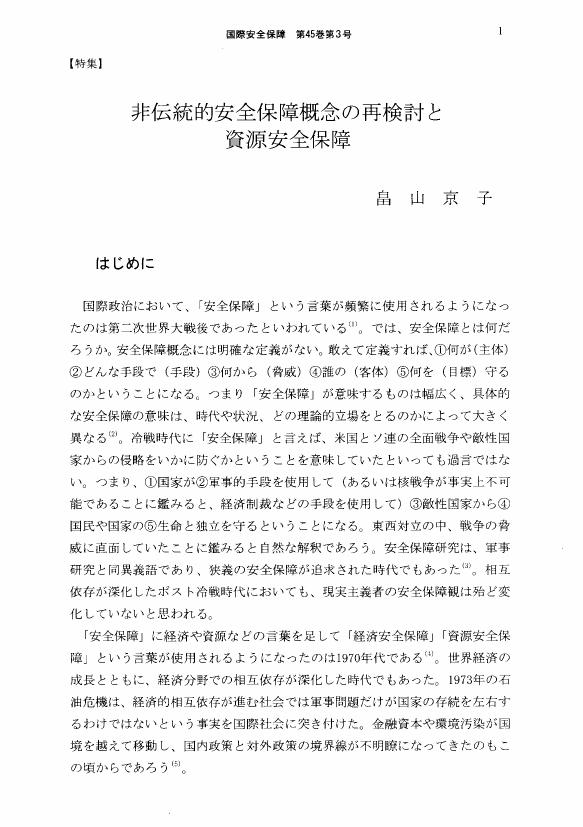2 0 0 0 OA 非伝統的安全保障概念の再検討と資源安全保障
- 著者
- 畠山 京子
- 出版者
- 国際安全保障学会
- 雑誌
- 国際安全保障 (ISSN:13467573)
- 巻号頁・発行日
- vol.45, no.3, pp.1-17, 2017-12-31 (Released:2022-04-01)
- 著者
- 畠山 京子
- 出版者
- 国際安全保障学会
- 雑誌
- 国際安全保障 (ISSN:13467573)
- 巻号頁・発行日
- vol.41, no.4, pp.117-121, 2014-03-31 (Released:2022-04-07)
1 0 0 0 OA 日本の国際平和協力とロールプレイ ―東チモールを事例として―
- 著者
- 畠山 京子
- 出版者
- 国際安全保障学会
- 雑誌
- 国際安全保障 (ISSN:13467573)
- 巻号頁・発行日
- vol.40, no.2, pp.93-108, 2012-09-30 (Released:2022-04-07)
1 0 0 0 OA 国内規範と合理的選択の相克
- 著者
- 畠山 京子
- 出版者
- 一般財団法人 日本国際政治学会
- 雑誌
- 国際政治 (ISSN:04542215)
- 巻号頁・発行日
- vol.2015, no.181, pp.181_115-181_128, 2015-09-30 (Released:2016-06-08)
- 参考文献数
- 67
Japan has been increasing its roles in a security field in the post-Cold War era. For instance, it decided to participate in peacekeeping operations, strengthened the alliance with the US and upgraded the peacekeeping missions to one of the Self Defense Forces’ core mission. In 2011, it mitigated the arms trade ban policy—an alleged hallmark of Japan’s anti-militarist norm. This article draws attention to the factors behind such changes Japan made on the security front by examining the arms trade ban policy announced in 1967. Arguing that Japan’s security policy has been largely constrained by an anti-militarist norm,constructivists have emphasized the significance of non-material factors in explaining a state’s behavior. The accounts seemed persuasive during the Cold War era when Japan shunned playing military roles. However, they failed to retain pertinence when Japan began to expand its military role after the end of the Cold War. In contrast, rationalists argue that a state pursues maximization of national interests; the behavior is determined by cost/benefit calculations. The shortcoming of the rationalist account is, however, that they either ignore or take a normative factor as given, failing to explain whether normative factors had an effect on a state’s behavior. By incorporating power considerations among actors, this article elucidates the factors behind Japan’s preference changes from rationalist point of view. It is argued by constructivists that the announcement of the arms trade ban policy and ensuing compliance were yielded by the internalization of the anti-militarist norm advocated by the Japan Socialist Party (JSP), which had acted as a norm entrepreneur as well as a protector. However, the investigation of the power balance between the successive Liberal Democratic Party governments and the JSP shows that they were driven by cost/benefit calculation. The 2011 mitigation made by the government under the Democratic Party of Japan was also precipitated by the calculation. By then, the power of the Social Democratic Party, a succeeding party of the JSP which once enjoyed certain influence during the Cold War period, had become negligible. As opposed to the constructivist claim, cost/benefit calculations, not the regulative effect of the norm, are the decisive factor operating behind Japan’s decision making process. More importantly, it is the power balance between norm entrepreneur and decision maker that largely influences the process of cost/benefit calculation.


